- Home
- James Axler
Labyrinth Page 8
Labyrinth Read online
Page 8
Before Ryan could close and strike with the panga, the big man had rolled to his feet. Pinkish blood oozed from his neck. The snap kick had ripped out a three-inch-square patch of his beard. The hair ball was stuck in the lugs of Ryan’s boot sole, along with a strip of skin.
Wicklaw smiled as if it didn’t hurt.
So it had to have.
“I eat sissy little shits like you for lunch,” he said as they circled and feinted. “Don’t worry, your ladies are gonna forget all about you in a week.”
Ryan ignored the taunts. The stage was a blank rectangle. There were no curtains. No ropes. No furniture. Nothing to throw or fight behind. As Ryan moved around and around, he maintained eye contact with Wicklaw, but he wasn’t just seeing the eyes. He was taking in the whole package at once, shoulders, arms, hips, legs. Wicklaw was light on his feet for someone so big. And with his apelike arms, he had the reach advantage, even with Ryan’s eighteen-inch blade.
The audience roared every time their pilgrim made a lunge, but they soon tired of all the circling and testing. They wanted action. They wanted blood.
Ryan’s blood.
Wicklaw tried another strategy, something that had worked for him before, no doubt. He suddenly charged, windmilling with the scythe, trying to knock Ryan off balance, or back him into a corner.
Ryan pivoted away at the last second, timing the move to duck past the downslashing blade. As the steel point brushed his back, he hacked behind the man’s knee, putting all his weight and spin-momentum into the downward blow. Under the flowing robe, it was difficult to tell where the target was. The panga slashed through the rough fabric and hit something solid, but it wasn’t flesh or bone.
It didn’t yield.
And for an instant, metal scraped on metal.
Wicklaw laughed and jumped away.
The panga had put a wide tear in the back of his robe, which made the hem drag on the floor. There was no blood. And from the way Wicklaw moved, no injury. As his opponent turned, Ryan glimpsed something dull and metallic through the hole in the fabric.
“What’s wrong, One Eye? You look surprised.”
With that, the big man came at him again, this time the furious charge was accompanied by waist-high, forehand-backhand slashes of the scythe, and piglike grunts of effort.
Ryan feinted a retreat, then parried and struck, bringing the panga’s sweet spot down on the man’s right thigh, just above and perpendicular to the knee. The heavy blade cut through the homespun cloth, then it stopped. The clash of steel on steel reverberated up his arm and the panga bounced off its target.
The blow made Wicklaw groan.
But it should have done way more than that.
It should have severed the bone in his leg, or failing that, clipped off his kneecap.
The big man sidestepped, limping slightly, keeping his blade moving to prevent a follow-up attack. Again there was no blood on the robe, no blood on the floor.
“Pil-grim! Pil-grim!” the crowd shouted, urging Wicklaw to rejoin the fight, figuring he had taken the best that the stranger could dish out.
Through the big slash in the front of the robe, Ryan could see what the problem was. He imagined Wicklaw’s wives sitting around the fire of a winter’s night, dutifully cutting, bending, pounding together the steel strands for their hubby’s chain mail leggings.
“You’re gonna have to do better than that, One Eye.”
He did.
Ryan moved right, lunging toward Wicklaw. As the big man tried to cut him with a backhanded swipe, he ducked under the blow and shifted the panga to his left hand. There was a steel toe cap on Wicklaw’s boot. Ryan chopped down just behind it.
Maybe there wasn’t enough steel wire to make footies for the leggings.
Maybe Wicklaw liked to wiggle his toes.
The panga cleaved through the first three inches of boot, all the way through the sole, and made a gash in the floor. The toe cap and its contents bounced away. For a second there was no blood and Ryan could see the white circles of five toe stumps in the now open-ended boot. Then the blood gushed. And gushed.
Squealing in pain, his face dead white under all the whiskers and hair, Wicklaw hopped on his good foot, trying in vain to staunch the bleeding with his free hand, and keep Ryan off with the scythe. The torn hem of his robe tripped him up and he fell hard onto his back.
The crowd moaned in unison.
Ryan was on top of him a second after his head hit the floor. Straddling the man’s chest, the one-eyed man brought the panga down hard with both hands. Not the point, but the knurled steel pommel.
Three hard blows.
Each punctuated by the crack of bone.
Amazingly, Wicklaw didn’t pass out. He spit shattered teeth and blood from his battered mouth and tried to get up.
Before the bigger man could buck him off, Ryan flipped the blade around. With his left hand, he pressed the point over Wicklaw’s heart. His right hand, clenched in a fist, he held ready to pound it in to the hilt.
A wail went up from the audience.
Realizing that all his wives were about to become widows, Wicklaw stopped fighting. His body went limp and he slumped back to the floor, coughing and blowing bubbles of blood.
As Ryan stood up and stepped away, from the rear of the room the single men booed him and catcalled. Not because he’d won, but because he hadn’t properly finished the job.
It was finished, as far as Ryan was concerned. There was no point in chilling the man. He was no longer a threat.
Wicklaw’s wives rushed onto the stage to tend to their man’s wounds. Two of them got the boot off, while the others made a tourniquet from a strip of the hem of his robe. They bound it around his instep, and torqued it down hard with the scythe handle to stop the bleeding. There wasn’t much they could do for his face.
Pilgrim Plavik remounted the stage and held up his arms for silence. When that didn’t work, he let out an ear-splitting yell that quieted the crowd.
Ryan looked down at Krysty, then at Mildred and J.B. They had their grens ready.
Truth time.
“No one in this room can claim the fight wasn’t fair and square,” Plavik said. “Everything was by the book, praise Bob, praise Enid.” He glanced back at the loser, who was sitting up on the floor with the help of his womenfolk. There were bits of teeth in his beard and the tips of the hair dripped blood.
To Ryan he said, “You thrashed him good. And as far as I can see, he didn’t even give you a scratch. Pilgrim Wicklaw shamed everyone in this ville with the piss-poor fight he put up.”
Again, the single men booed.
“Because you won,” Plavik shouted over the noise, “you keep your women. And you keep his trade goods, too.”
Ryan frowned. It was part of the deal he hadn’t foreseen.
“Come on up here, Jubilee,” Plavik said.
As the pregnant girl walked across the stage, the people of Little Pueblo began to clap and sing, “Deedit-deedee. Dee-dit-deedee.”
Chapter Eight
The sun was sinking below the horizon by the time the ville folk started filing out of the El Mirador. In all, eleven young women and girls had changed husbands, divorces and marriages accomplished in the same ceremony, a bargain sealed by a song without words.
Five of the six pilgrims appeared satisfied with their respective deals, but to Ryan it seemed an odd satisfaction under the circumstances—detached, passionless, as if they’d traded prize cows or pigs. The only celebration he’d witnessed was communal, a tribe thing. Although the pilgrims’ wives welcomed the new brides with an embrace, the newlyweds themselves didn’t touch.
Which was just fine with Ryan.
His pregnant, teenage bride followed on his heels as the companions set off across the town square park. Ryan shifted the Steyr on its shoulder sling to adjust the balance point. Krysty, Mildred, Doc, Jak and J.B. still had their blasters, too. That the ville folk hadn’t asked them to surrender their weapons surprised Ryan. M
ost remote villages in Deathlands had some kind of a leave your guns at the gate policy to minimize the chance of violence. Not that the companions would have honored a request like that, anyway. They were a different breed than the unarmed, sackcloth-robed farmers. They moved in sync, triple alert, like a military unit, or chilling crew, their skins and clothing tinged with ground-in, greasy dirt from the desert crossing. Creatures from the dark side.
“You have to talk to her,” Krysty told him.
He answered with a noncommittal grunt.
“She didn’t ask for this any more than you did.”
Ryan wasn’t shocked that his long-time lover would take the side of the young girl he had supposedly just married, and was now expected to take full responsibility for. Krysty always managed to look below the surface, past the superficial, to the beating heart of things. She saw Jubilee as a tragic victim, not a threat to their relationship. That’s the kind of woman she was. And one of the reasons he loved her so passionately.
Though Ryan also felt sorry for Jubilee, from experience he knew there were things he was powerless to change, and therefore had to accept. Like it or not, the hellscape was triple hard on its womenfolk. And the females who couldn’t defend themselves—the young ’uns, the dimmies, the physical weaklings—got the worst of it by far.
“I know what you’re thinking, Ryan,” Krysty said. “This is her place, these are her people. You want to leave her here when we go.”
“And you want to take her with us?”
“They’ve already turned her into a baby-making machine. You heard that bug-eyed bastard Plavik, bragging about how she was going to pop out fifteen kids, one after another, until she drops dead. What kind of life is that for a human being?”
“I think you’re jumping to conclusions. You’re mixing up what you feel and what she feels. Maybe she wants to stay in Little Pueblo. It’s all the life she knows.”
“That doesn’t make it right.”
“Staying here is her best chance to survive, and you know it,” Ryan said. “If we have to walk across that desert, and she comes along, she’s never going to make it. It’d be kinder to put a bullet in her head right now.”
What he didn’t have to say was that the weight of one more life—two, counting the baby she carried—on a desert crossing might be enough to tip the balance and get them all chilled.
“But we may not have to cross on foot,” she said. “Not if we can break into the redoubt and access the mat-trans unit.”
“And the mat-trans still works,” he added.
“Yeah, that, too, of course.”
“Look,” Ryan told her, “I don’t want to get this girl’s hopes up, and then have to let her down. She’s been hurt plenty. And she doesn’t need more of that from us. If the mat-trans unit is operational and she wants to leave, we’ll take her along, and at the other end find a safe place for her to have her baby. But if we can’t get into the redoubt, or the unit doesn’t work, she stays behind. No arguments.”
That seemed to satisfy Krysty, at least for the moment.
Ryan glanced over his shoulder. His new bride had dropped back a few yards and Mildred was walking at her side, speaking softly to her. The pregnant girl wore her blond hair pulled straight back and braided into a long, slender plait. She kept her blue eyes downcast, and her pale lips drawn tight.
Jubilee hadn’t said two words to anybody since she crossed the El Mirador’s stage. If she’d even looked at Ryan, he hadn’t seen it. He could understand how someone so young, and in such dire straits, would be numbed by the turn of events. Expelled not only from her family group, but as things turned out, from her entire community her lot suddenly thrown in with that of strangers. But there was something else, too. Under the shock, the feeling of being abandoned, under the sadness, there was fear. It was etched in her face and the way she carried herself. A more terrible fear than circumstances warranted, Ryan thought. Like she was walking a tightrope. Or a plank. With doom all around her.
Maybe she was crazy.
Or a drama queen.
One thing was sure, she was one hundred pounds of trouble.
With his four wives and ten children in tow, Pilgrim Plavik led the way across the park. He’d promised the companions a fine, home-cooked meal to welcome them to Little Pueblo.
Though his stomach was growling again, Ryan wasn’t thinking about food. He was thinking about the blackheart, water-stealing son of a bitch they’d followed to the edge of the ville. If a man wandered into a place like this, with no women to trade, nothing but his muscle and bone to offer, he was bound to end up in the theater’s back rows and aisles with the other unhappy bachelors. No way would he make the rank of pilgrim overnight; in fact, the odds of him ever making pilgrim were slim. On its face, the social order of Little Pueblo appeared to be just that bottom heavy. Without blasters or squads of sec men, the few had found a way to dominate the many. Jubilee wasn’t the only one who kept her eyes focused on the ground most of the time. The single men and all the other women and children lowered their heads in deference to the ville’s chosen ones.
The six pilgrims controlled all the available females. And had therefore presumably sired all the ville’s children. The non-alpha males hung around the fringes of the alpha-males’ harems, most likely doing all the fieldwork, looking for their big chance to move up, or sneak some illicit fun when the pilgrims turned their backs. Not an unusual strategy for group survival. Ryan had seen it before, in other remote villes. What was unusual, however, there didn’t appear to be any person, male or female, older than thirty years of age.
When they reached the far side of the town square, Plavik took them across the street to the three-story stone building with the tall clock tower. The clock wasn’t working. At some point during the initial flooding or subsequent reemergence, one of its huge, steel hands had fallen off. Every window facing the street was either crudely boarded up or covered with sheet plastic. As Plavik and his entourage trooped up a single flight of wide stone steps to the double front doors, Ryan noted the building’s cornerstone, which bore the inscription: Little Pueblo City Hall Built 1913 A.D.
Before he started up the steps, Ryan took a look back at the park. The other pilgrims and their families were crossing the street, heading for city hall. Not Wicklaw, though. He wasn’t anywhere in sight. With half a right foot, it was going to be awhile before he crossed anything. Although the whole town had followed them through the square, the nonpilgrim men had stopped short of the street, and stood watching from the far side. A mob of robed ghosts.
Inside, the predark building showed considerable water damage. Most of the floor tiles were loose. The wooden trim moldings along the base of the walls, under the high ceiling, and around the doors were either missing or had warped and sprung loose from their moorings. The tan, gloss-enameled walls showed broad patches of discoloration, as did the ceiling.
A century’s worth of mold from the smell of it, Ryan thought.
Short of tearing out the load-bearing walls, there had been no way to dry out the lathe and plaster after the reservoir had drained off.
Plavik moved past a set of corroded elevator doors that had been nailed shut and decorated with the words: All Glory to Bob and Enid. He started up the staircase at the end of the entry hall. The stairs were made of steel and hadn’t fared so well under five hundred feet of water. The treads and railings had completely rusted out in spots, in others the metal was filigreed and paper thin. The major damage had been repaired and braced with scraps of wood, iron pipe, angle brackets and bailing wire. As Plavik and his family climbed, and the companions followed, the whole staircase began to groan and shake. Only Ryan and the companions seemed concerned by this.
Six flights up, they moved off the rickety stairs and onto the building’s top floor. The town’s municipal offices, preflood, had been turned into living quarters. The rooms were furnished in the same, junkyard style as the one-story businesses around the square: crude beds on concrete
blocks, crude mattresses made of straw, the occasional piece of watermarked, veneer-peeling furniture; no rugs on the floors; mold spots on the walls, between hand-lettered imprecations to Bob and Enid.
The plastered ceilings had collapsed in places, exposing bare lath. One room had been turned into a kitchen. The stove, a predark Kenmore electric, had been stripped, raised a foot and a half from the floor by stacked, steel wag rims and converted to burn wood. Its makeshift vent pipe poked out through a hole in the scrap metal that covered the tall, narrow window. A huge, covered caldron and a steel, automobile hubcap half filled with what looked like vegetable oil sat on the cook top.
The brief home tour ended where it had begun, in one of the suite’s living room-bedrooms. Plavik offered his guests seats on the various platform beds, then dismissed his women and children with an impatient wave of his hand. The children made themselves scarce, and the wives moved into the kitchen to prepare the feast. When Jubilee started to follow the women, Mildred caught her by the arm and made her sit down.
Plavik seemed amused by this.
Though Ryan and the others sat, they couldn’t pretend to look comfortable. It wasn’t just the hard beds. Or the smell of mold. Or the subjugation of the ville’s women. Plavik’s body language and facial expression told them he had something up his sleeve. Something nasty. Big fun for him, the opposite of big fun for everyone else.
“Why don’t you tell us something about your ville?” Ryan said.
The bug-eyed man twisted a strand of beard around his index finger. “Little Pueblo was, then it wasn’t,” he said with a grin. “Then it was, again. When I showed up here, it’d been risen from the ashes for nearly a century, praise Bob, praise Enid. I came over from the east, at the border of the Shens. That’s where all my people lived. Wanted to see some of the world while I was young. Set off on my own. I was wild and triple stupe back then. Worked in gaudies and jolt shacks all through the western territories. I ran my own string of skanky sluts on the side, sold battery acid disguised as jolt to folks dumber than me and did some robbing when it didn’t take too much effort. To make a long story short, I got myself in one big stinking mess after another. And the scrapes always ended up with blades or blasters, and blood on the floor. I’ll tell you, I’m lucky to be walking around alive today.”

 End Program
End Program Nemesis
Nemesis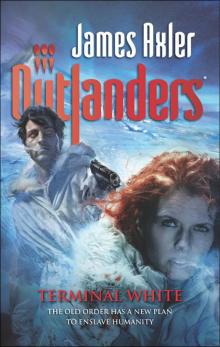 Terminal White
Terminal White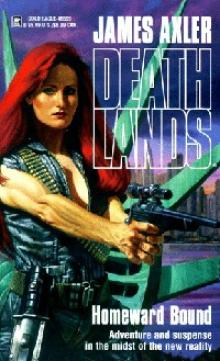 Homeward Bound d-5
Homeward Bound d-5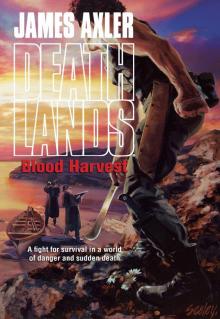 Blood Harvest (v5)
Blood Harvest (v5) Amazon Gate
Amazon Gate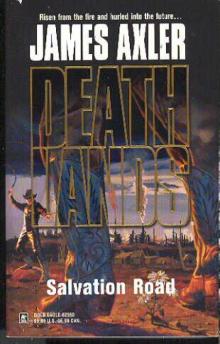 Salvation Road
Salvation Road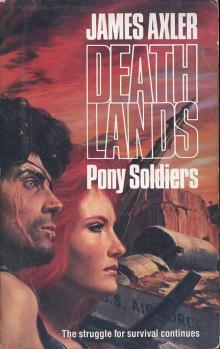 Pony Soldiers
Pony Soldiers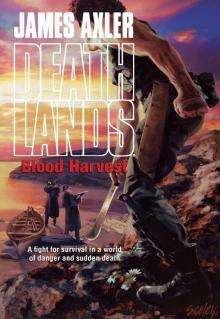 Blood Harvest
Blood Harvest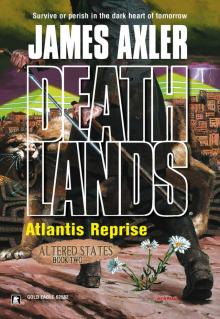 Atlantis Reprise
Atlantis Reprise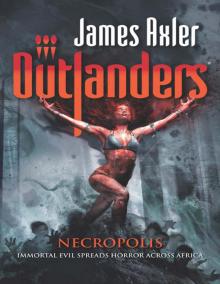 Necropolis
Necropolis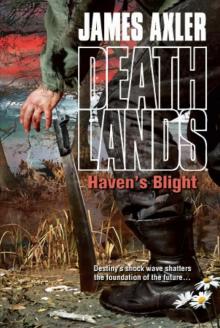 Haven's Blight
Haven's Blight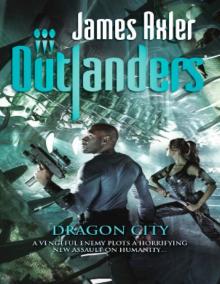 Dragon City
Dragon City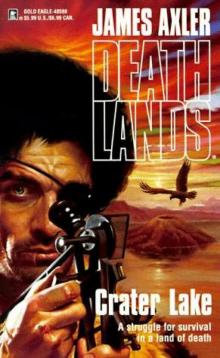 Crater Lake
Crater Lake Storm Breakers
Storm Breakers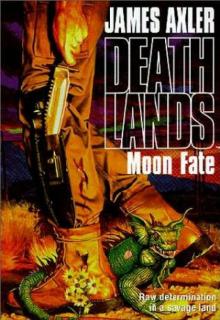 Moon Fate
Moon Fate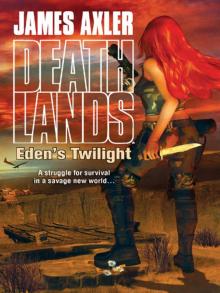 Eden’s Twilight
Eden’s Twilight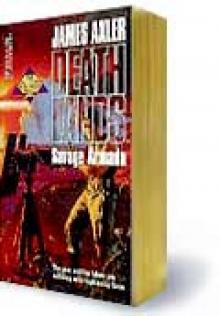 Savage Armada
Savage Armada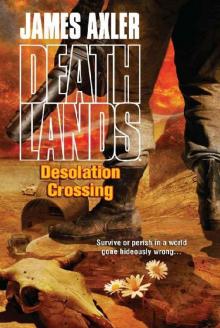 Desolation Crossing
Desolation Crossing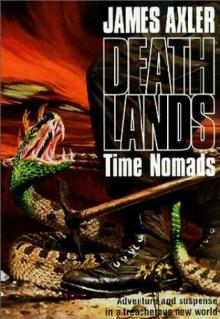 Time Nomads
Time Nomads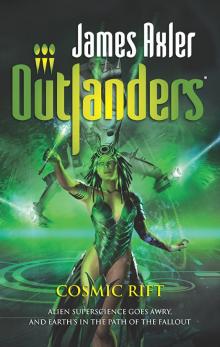 Cosmic Rift
Cosmic Rift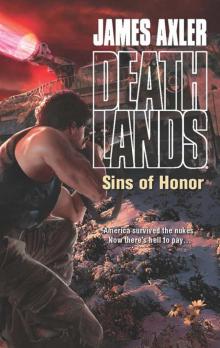 Sins of Honor
Sins of Honor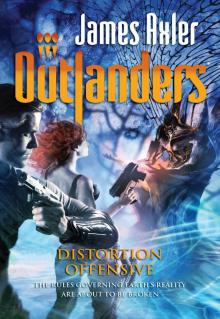 Distortion Offensive
Distortion Offensive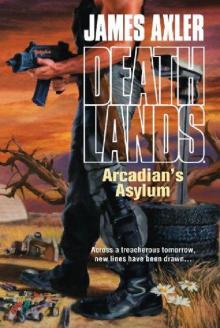 Arcadian's Asylum
Arcadian's Asylum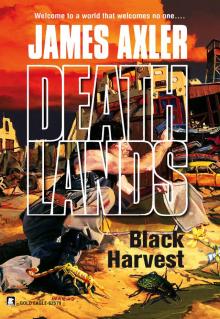 Black Harvest
Black Harvest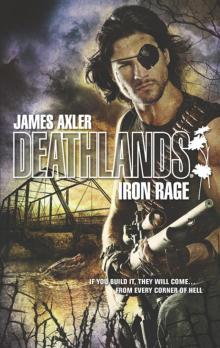 Iron Rage
Iron Rage Nightmare Passage
Nightmare Passage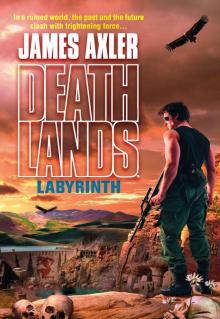 Labyrinth
Labyrinth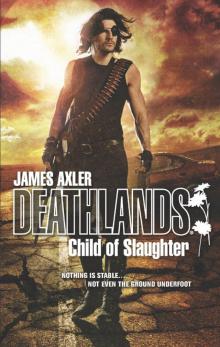 Child of Slaughter
Child of Slaughter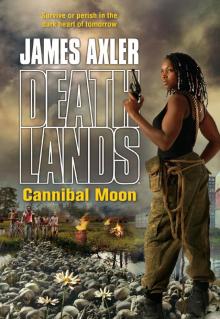 Cannibal Moon
Cannibal Moon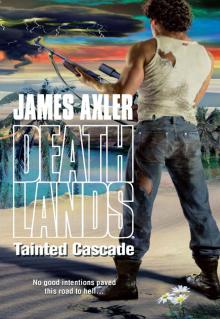 Tainted Cascade
Tainted Cascade Ritual Chill
Ritual Chill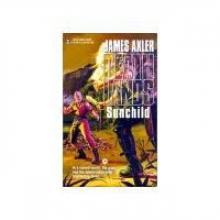 Sunchild
Sunchild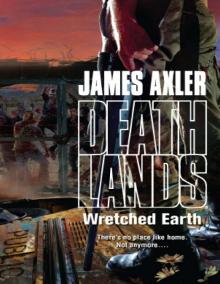 Wretched Earth
Wretched Earth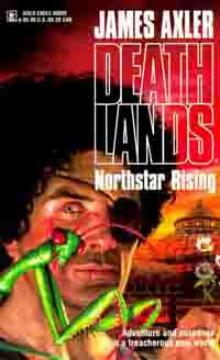 Northstar Rising d-10
Northstar Rising d-10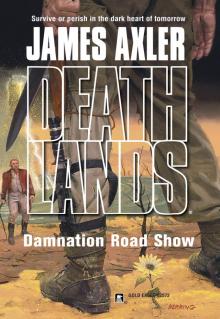 Damnation Road Show
Damnation Road Show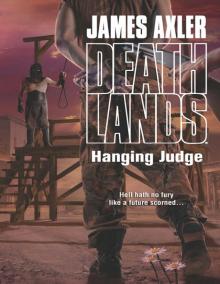 Hanging Judge
Hanging Judge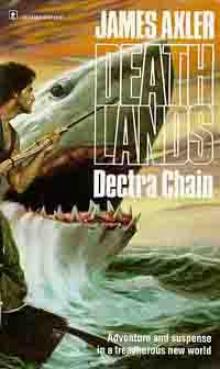 Dectra Chain d-7
Dectra Chain d-7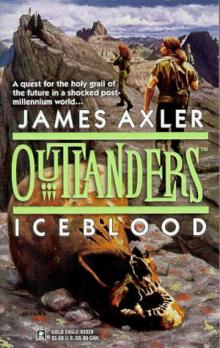 Iceblood
Iceblood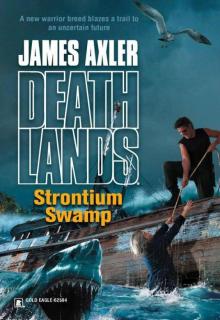 Deathlands 074: Strontium Swamp
Deathlands 074: Strontium Swamp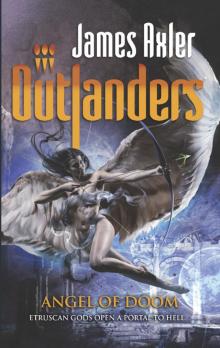 Angel of Doom
Angel of Doom Sunspot
Sunspot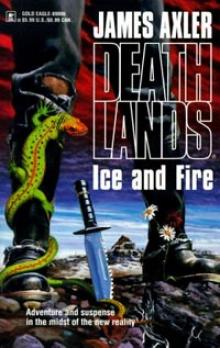 Ice and Fire d-8
Ice and Fire d-8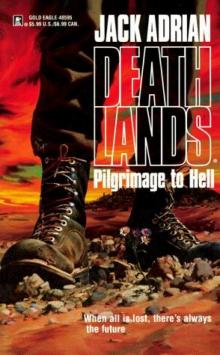 Pilgrimage to Hell d-1
Pilgrimage to Hell d-1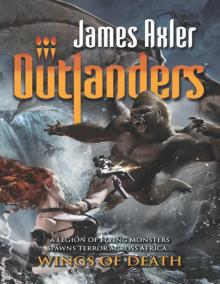 Wings of Death
Wings of Death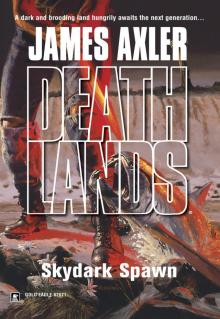 Skydark Spawn
Skydark Spawn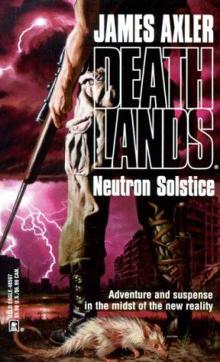 Neutron Solstice d-3
Neutron Solstice d-3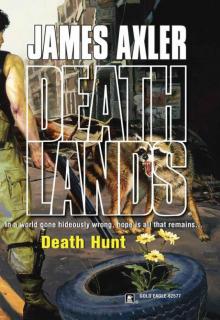 Deathlands 067: Death Hunt
Deathlands 067: Death Hunt Pilgrimage to Hell
Pilgrimage to Hell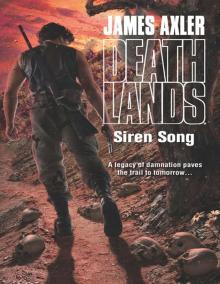 Siren Song
Siren Song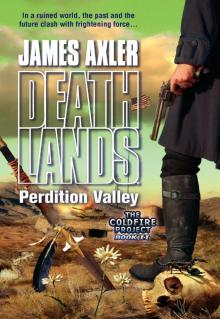 Perdition Valley
Perdition Valley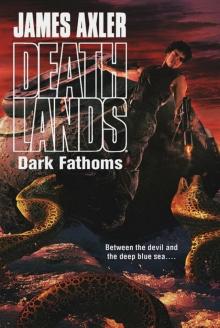 Dark Fathoms
Dark Fathoms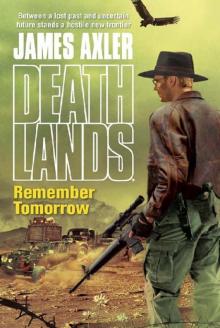 Remember Tomorrow
Remember Tomorrow Crucible of Time
Crucible of Time Savage Armada - Deathlands 53
Savage Armada - Deathlands 53 Judas Strike - Deathlands 54
Judas Strike - Deathlands 54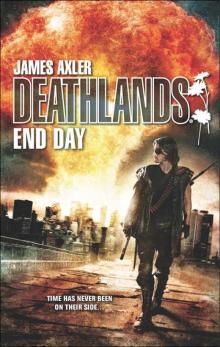 End Day
End Day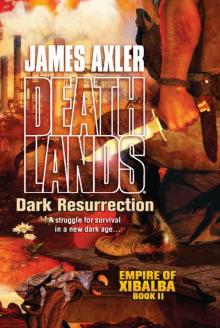 Dark Resurrection
Dark Resurrection Deathlands - The Twilight Children
Deathlands - The Twilight Children Deathlands 068: Shaking Earth
Deathlands 068: Shaking Earth Breakthrough
Breakthrough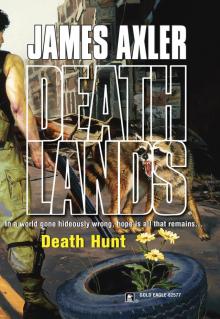 Death Hunt
Death Hunt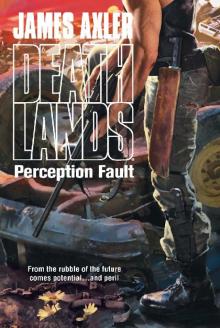 Perception Fault
Perception Fault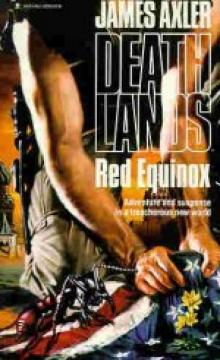 Red Equinox
Red Equinox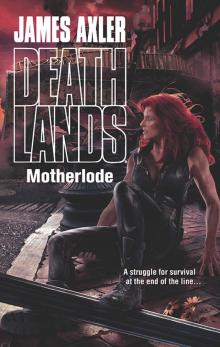 Motherlode
Motherlode Deathlands 071: Ritual Chill
Deathlands 071: Ritual Chill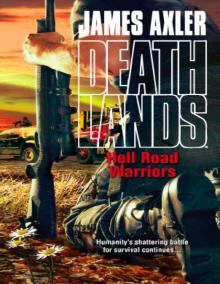 Hell Road Warriors
Hell Road Warriors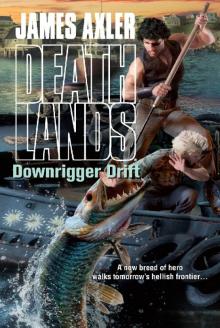 Downrigger Drift
Downrigger Drift Gaia's Demise
Gaia's Demise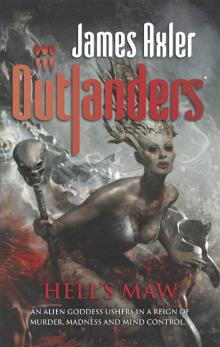 Hell's Maw
Hell's Maw Devil's Vortex
Devil's Vortex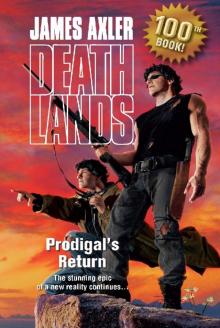 Prodigal's Return
Prodigal's Return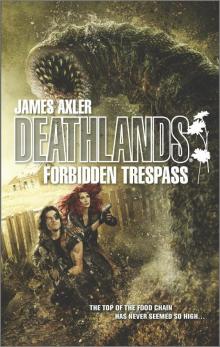 Deathlands 122: Forbidden Trespass
Deathlands 122: Forbidden Trespass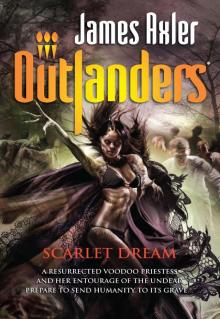 Scarlet Dream
Scarlet Dream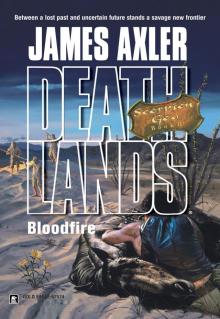 Bloodfire
Bloodfire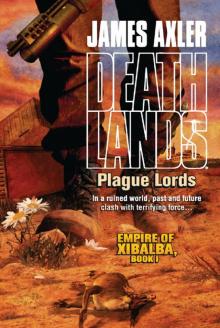 Plague Lords (Empire of Xibalba, #1)
Plague Lords (Empire of Xibalba, #1)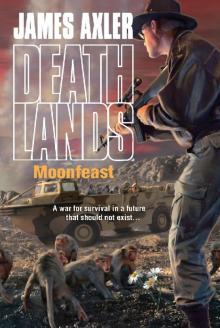 Moonfeast
Moonfeast Latitude Zero
Latitude Zero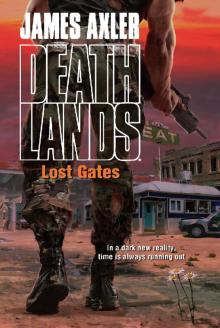 Lost Gates
Lost Gates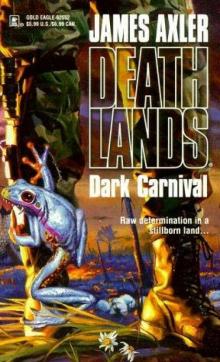 Dark Carnival
Dark Carnival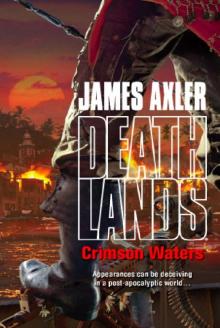 Crimson Waters
Crimson Waters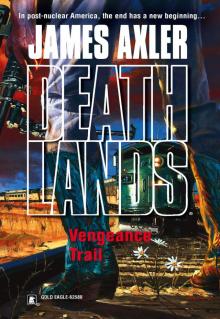 Vengeance Trail
Vengeance Trail Apocalypse Unborn
Apocalypse Unborn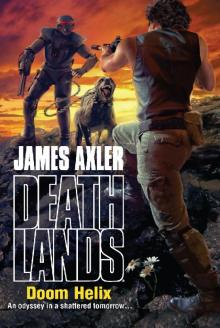 Doom Helix
Doom Helix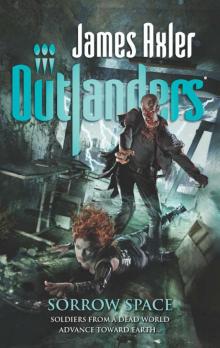 Sorrow Space
Sorrow Space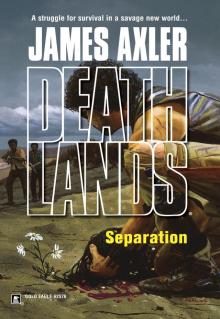 Separation
Separation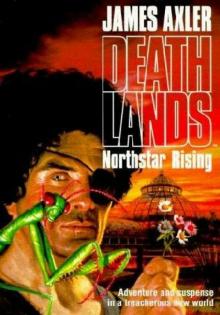 Northstar Rising
Northstar Rising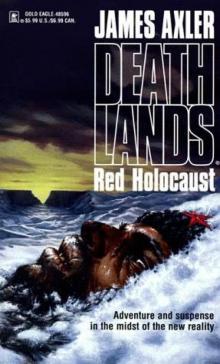 Red Holocaust
Red Holocaust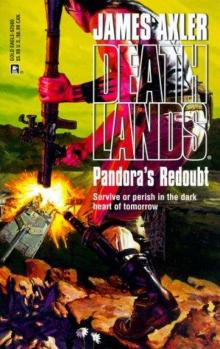 Pandora's Redoubt
Pandora's Redoubt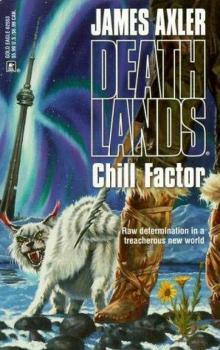 Chill Factor
Chill Factor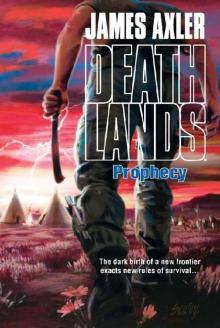 Prophecy
Prophecy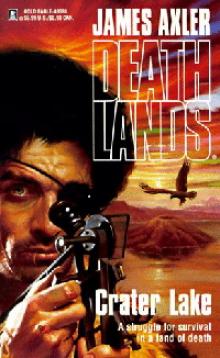 Crater Lake d-4
Crater Lake d-4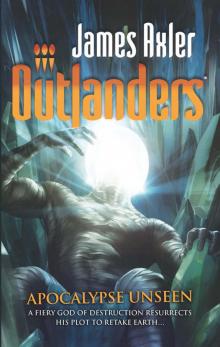 Apocalypse Unseen
Apocalypse Unseen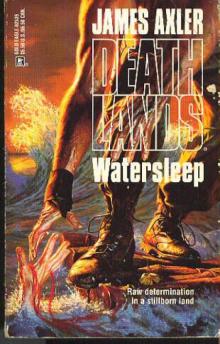 Watersleep
Watersleep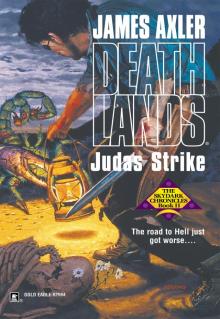 Judas Strike
Judas Strike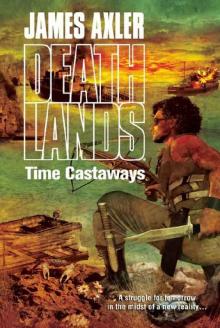 Time Castaways
Time Castaways Baptism of Rage
Baptism of Rage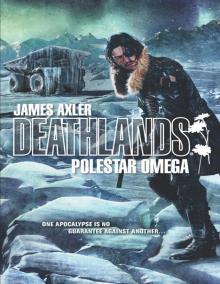 Polestar Omega
Polestar Omega Red Holocaust d-2
Red Holocaust d-2 Outlanders 15 - Doom Dynasty
Outlanders 15 - Doom Dynasty Way of the Wolf
Way of the Wolf Deathlands 075: Shatter Zone
Deathlands 075: Shatter Zone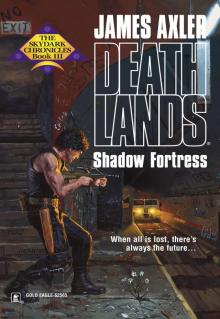 Shadow Fortress
Shadow Fortress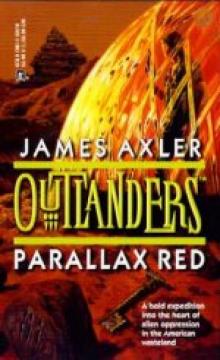 Outlander 05 - Parallax Red
Outlander 05 - Parallax Red Shaking Earth
Shaking Earth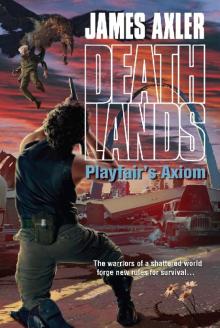 Playfair's Axiom
Playfair's Axiom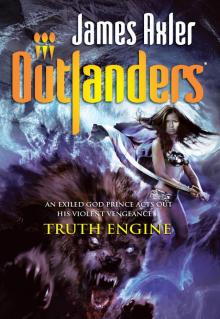 Truth Engine
Truth Engine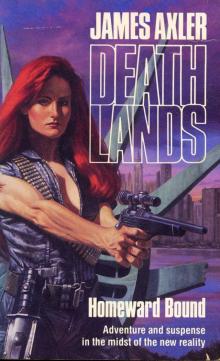 Homeward Bound
Homeward Bound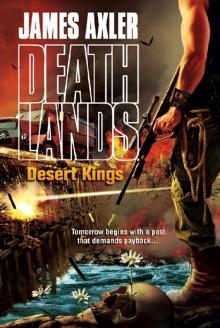 Desert Kings
Desert Kings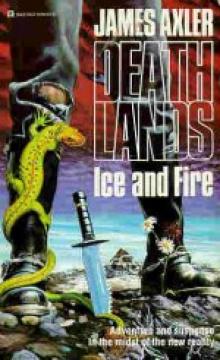 Ice and Fire
Ice and Fire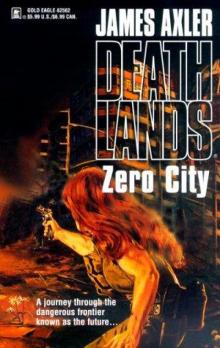 Zero City
Zero City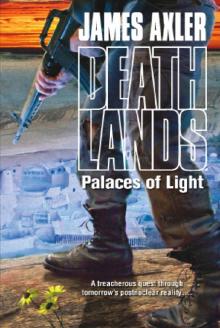 Palaces of Light
Palaces of Light No Man's Land
No Man's Land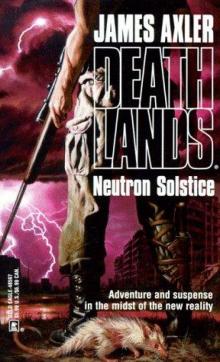 Neutron Solstice
Neutron Solstice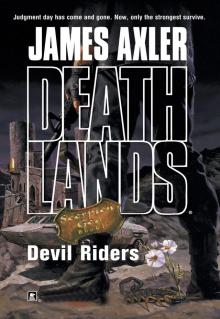 Devil Riders
Devil Riders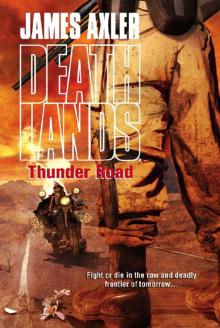 Thunder Road
Thunder Road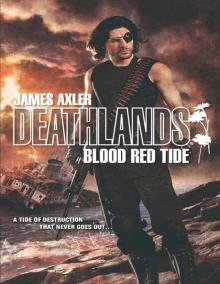 Deathlands 118: Blood Red Tide
Deathlands 118: Blood Red Tide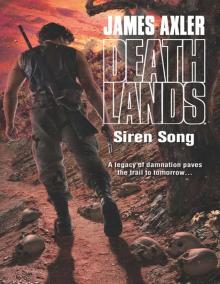 Deathlands 114: Siren Song
Deathlands 114: Siren Song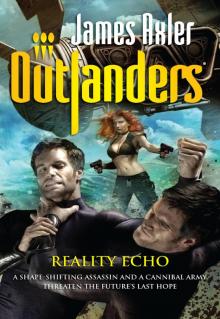 Reality Echo
Reality Echo Hive Invasion
Hive Invasion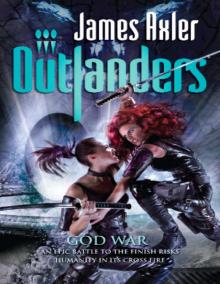 God War
God War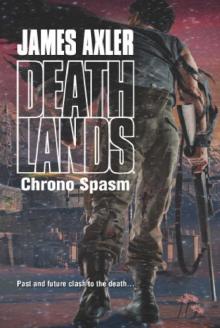 Chrono Spasm
Chrono Spasm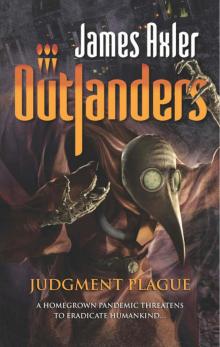 Judgment Plague
Judgment Plague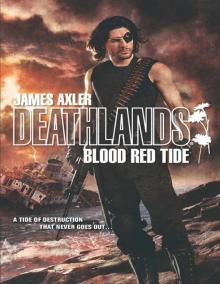 Blood Red Tide
Blood Red Tide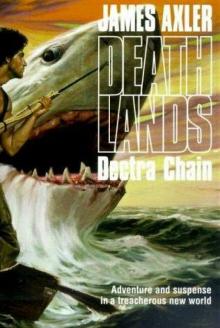 Dectra Chain
Dectra Chain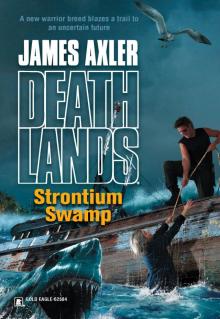 Strontium Swamp
Strontium Swamp Seedling
Seedling Shatter Zone
Shatter Zone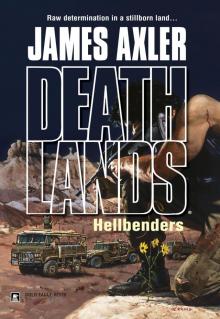 Hellbenders
Hellbenders